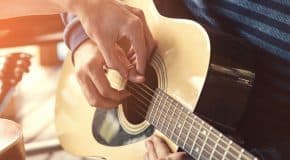
This blog post is for parents who want to help their children apply what they know about guitar and use their skills after the take guitar lessons.
What’s Next Now The My Child Plays The Guitar
Here are three things that your child can do after taking guitar lessons for a few years:
Start A Band
Now I know what you’re thinking here, why would I want all this extra noise in my house week after week? However, there is a way that you can do this without having to cause a bunch of extra noise at your own house. No doubt that your child has learned many songs during their time in guitar lessons and it’s really great if they can use that knowledge with other students. After all, music is a social thing. There are only a few instruments that actually makes sense to play solo performances but even solo performances are bolstered with background instruments to make the overall performance better.

A way that you can help your child create their own band and not have it at your house is by speaking with their music teacher at school and asking if there is an empty room that the students can practice after school. With an empty room to practice in after school the child can ask their other friends who take lessons, like guitar or bass guitar, drums or piano, and set up in an empty classroom after school to play songs together. you may even invite your guitar teacher to lead the small group in learning how to play together. Many music teachers truly enjoy working with ensembles and helping young students learn how to play all together.
Sit In On Your Teachers Gig
Many teaching musicians are also performing musicians. Full-time musicians do several things in order to make income and performing is one of those sources of income. Sometimes musicians play regularly in restaurants and have lots of freedom in order to invite their students to play along with them. A lot of times this can give a student something to strive for and can excite the students about playing music all over again by giving them a performance in which they can “sit in” and play along with their teacher. And even if they do not play in such a setting where they can invite their students to play with them, typically a musician knows someone who does have that freedom at their gig.
Some guitar teachers may present an opportunity like this naturally but others may not. Parents and guitar lesson students shouldn’t be afraid to bring up the topic. The best part for the teacher is he/she is going to have some extra people come to their gig; the venue owner will appreciate it too!
Take Guitar Lessons & Challenge Yourself
Sometimes students do not like competition with other students and that’s okay. So, the alternative is to compete against yourself and see if you can reach milestones set by music boards. One such board is the Royal School of Music, based out of the UK, but has an affiliate in the United States. Your guitar student can work on these milestones set by the Royal School of Music, or even to work on the assessment milestones set by the lessons company itself, like Lessons In Your Home’s Treble Clef Society. Both of which have the same goal of meeting a set of standards in order to challenge the student to higher success.
Many parents wonder if their child would be good enough to pursue music in higher education, especially after a child has been taking music lessons for longer than 5 years. The average student does struggle sometimes with good practice habits, however the practice habits are usually built around some type of goal or the excitement of playing a certain song. Both of these are combined when trying to reach milestones and can be utilized in order to help a student build a foundation to be prepared for music at an institution of higher learning.
This Is Why We Teach
Sometimes guitar lesson students never realize all the things they can do. The journey always presents a challenge so they don’t see the success they have with the abilities they already have. So these are three things that you as parents and we as teachers can do with our young guitar students in order to help bolster inspiration and excitement around their instrument once again.
These three opportunities can help introduce a new element into lessons and help the student further establish an identity as a better musician even if that student does not want to become a professional musician, all three of these avenues set them up perfectly for making them their best selves.


